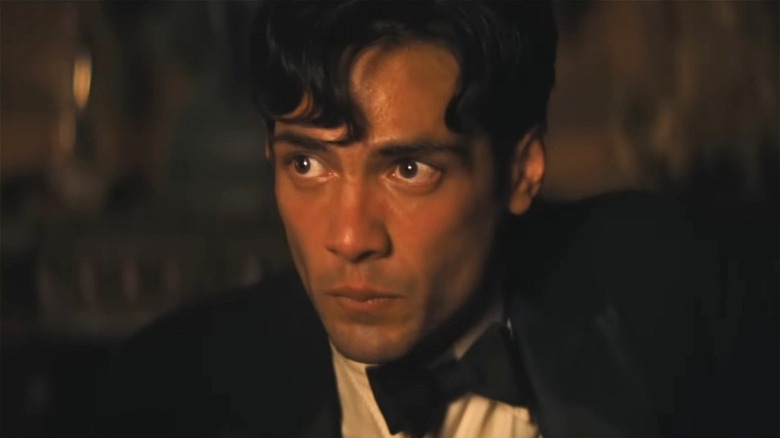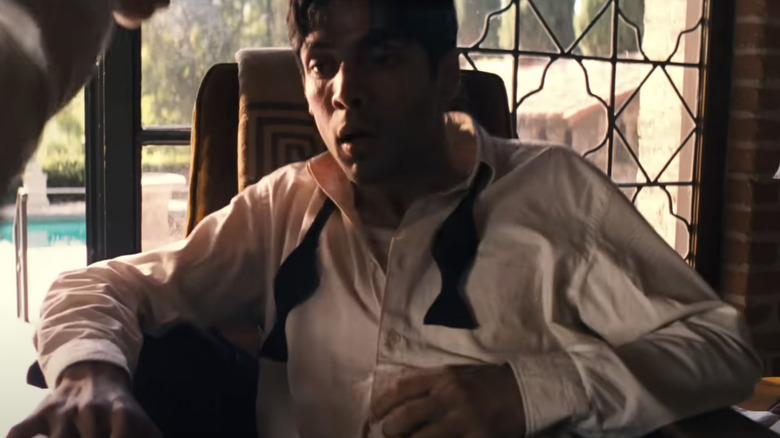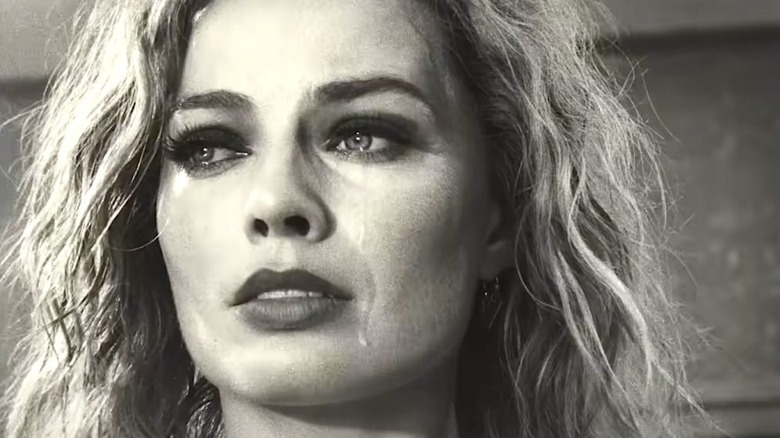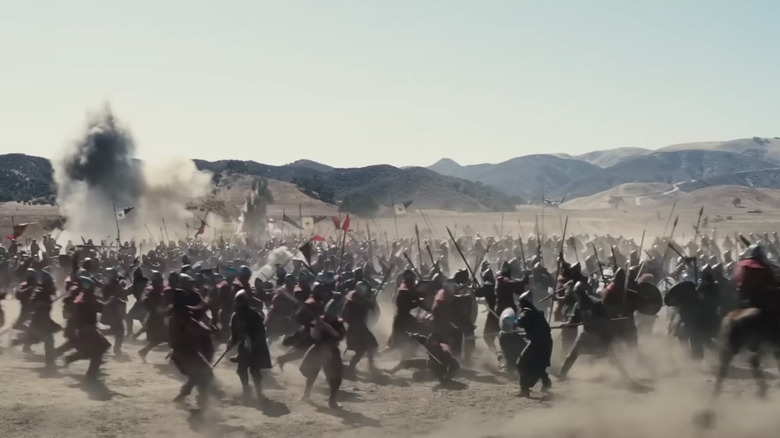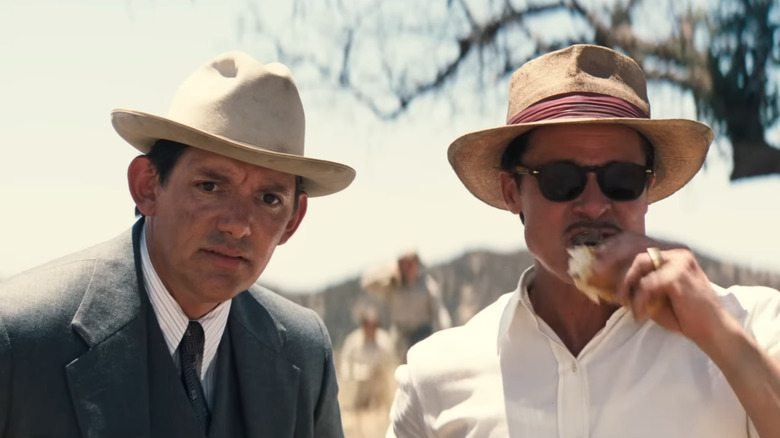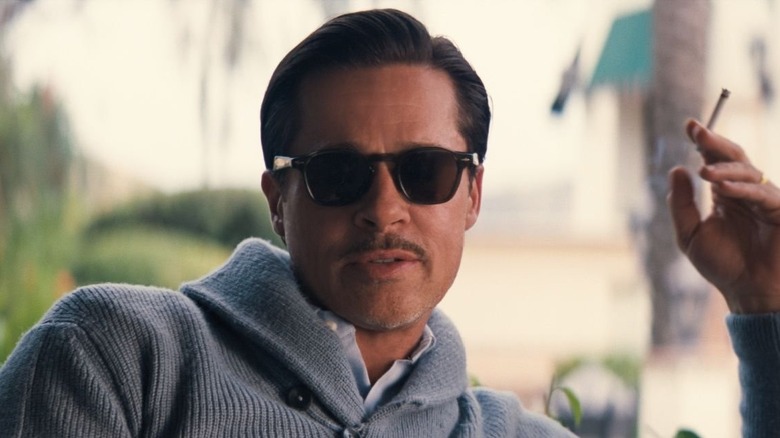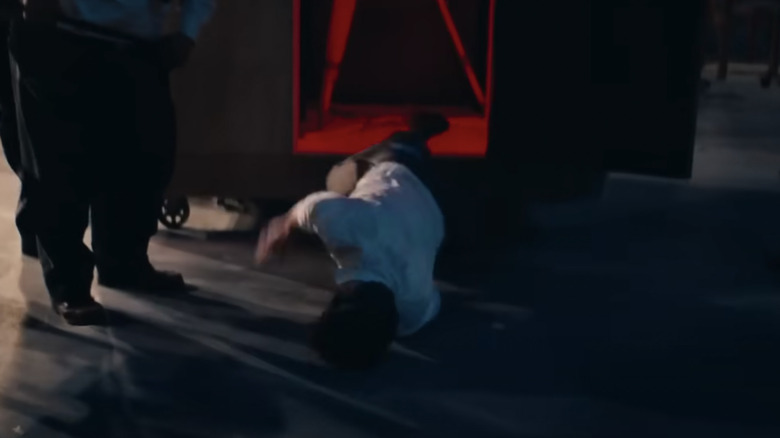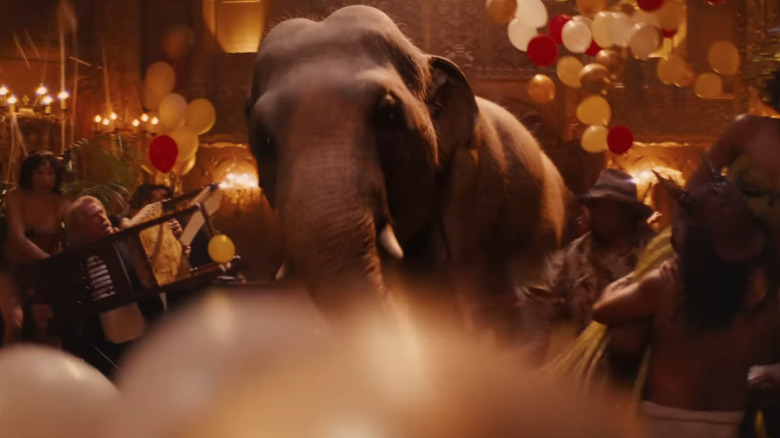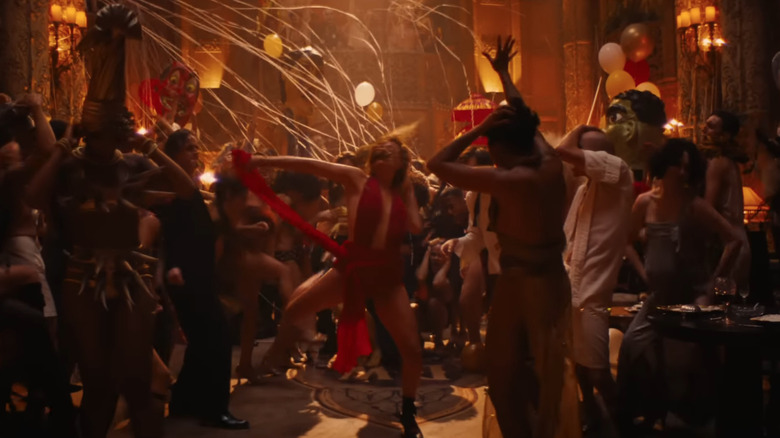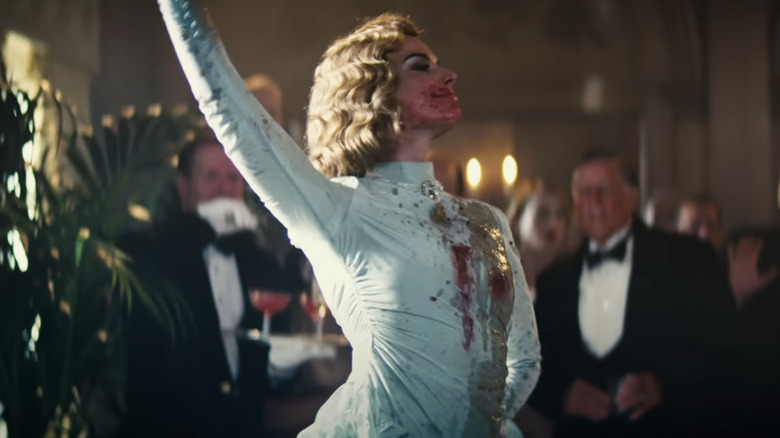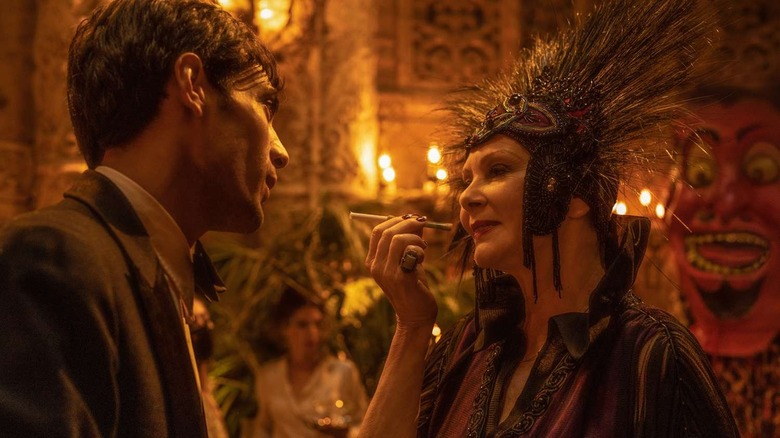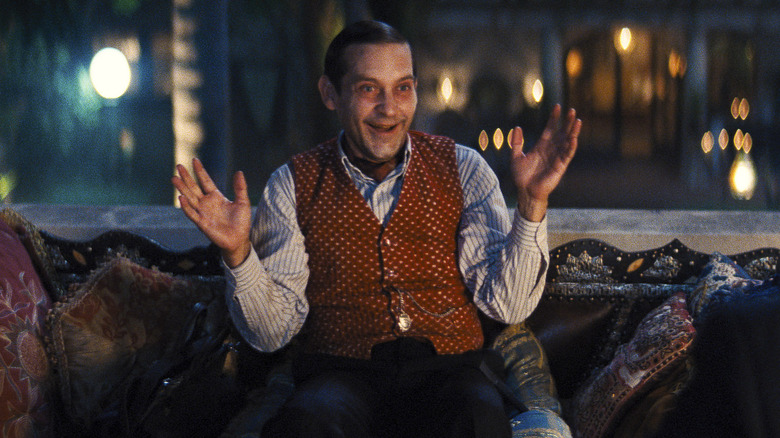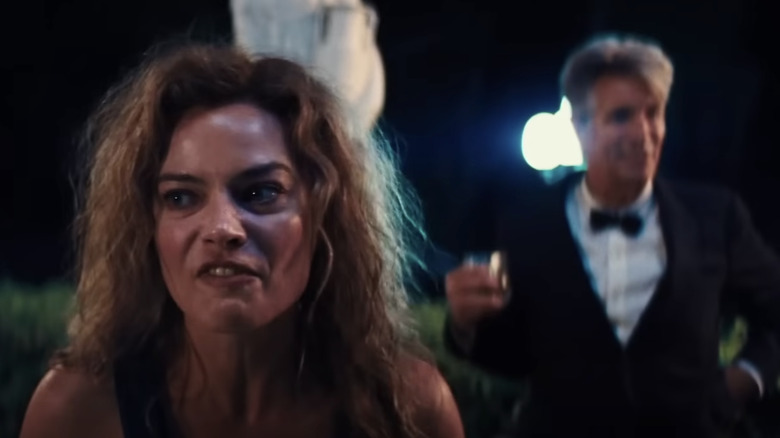Babylon's 12 Most Over-The-Top Moments Ranked
The following article includes discussions of excessive drug use.
Not long ago, Damien Chazelle won an Oscar for best director for his mostly well-liked, slightly controversial, and relatively saccharine musical about jazz and the movie business, "La La Land." He's back and tackling the same subject matter with "Babylon," a film that's less well-liked, more controversial, and decidedly less sweet than Emma Stone and Ryan Gosling's soft-shoed romp through Hollywood. Though the same person made them, "Babylon" feels like it could be Quentin Tarantino's or Martin Scorsese's version of "La La Land," with its drier humor, gratuitous sex and violence, and harder R-rating sensibilities. Until the very end, there's nothing sentimental about this fictionalized look back at the way things were in Los Angeles, circa 1926 to 1932.
"Babylon" is loosely based on real people and events that found their way into the gossip rags of the day. Margot Robbie stars as Nellie LaRoy, a stand-in for Clara Bow, while Diego Calva shines as Manny Torres, who's inspired by real-life figures like René Cardona. The film explores the moment in which cultural attitudes changed from being permissive (toward not only sex and substance use, but also the participation of nonwhite employees in the workplace) to buttoned-up. As such, "Babylon" depicts the outrageous 1920s giving way to the repressed 1930s through a core group of famous and fame-adjacent characters. The hijinks they get into range from humorously awkward to mortifyingly absurd, and more than once, they end in death. These are the most over-the-top, ranked from "whoa" to "WTF?"
12. The title card
"Babylon" isn't just in-your-face with its depiction of roaring 20s era sex, drug use, violence, and other excesses. It's also artistically indulgent beyond anything else Chazelle has ever done. Much has been made about how the film's three-hour-plus runtime may have affected its box office prospects. At least Chazelle's "more is more" approach to "Babylon" means it isn't boring, but the writer-director luxuriates within single scenes and even single shots for longer than he has to on occasion. And one creative decision stretches the audience's very concept of basic story structure while highlighting just how long "Babylon" is. The title card doesn't appear until — wait for it (literally) — 32 minutes into the movie. That'd be a third of the way through a more traditional film — or the entire length of a sitcom episode — but in the case of "Babylon," there's still more than two and a half hours to go.
Whether the purposefully delayed drop of the title graphic comes off as novel or obnoxious will depend on whether a viewer has bought into Chazelle's schtick by the 30-minute mark. It's a bold and almost self-congratulatory move after the assault on the senses that is the opening sequence, but it's also a logical one, narratively speaking. The plot of "Babylon" (as much as there is one) is that Manny and Nellie both want to get onto a movie set and make something of themselves. The title card divides the film into a sort of before and after they each achieve the first step toward their dream.
11. The final montage
The beginning of "Babylon" is indulgent in a fairly straightforward way. Plenty of directors have reveled in just how much debauchery they can cram into a prestige film. But the ending is its very own brand of over-the-top, and its tone contradicts the rest of the movie. After three hours of watching Hollywood chew up and spit out people like Sidney Palmer (Jovan Adepo), Lady Fay Zhu (Li Jun Li), Jack Conrad (Brad Pitt), and Nellie LaRoy, the last 10 minutes flash forward to 1952. A now-40-something Manny has returned to Los Angeles with his wife and daughter.
They aren't nearly as enchanted as Manny is, so he takes in a screening of "Singin' in the Rain" alone. "Babylon" owes a lot to the 1952 classic, and Chazelle knows it. Its inclusion here is an admission that his film is an homage — or, in his words, a "darker companion piece." But the manner in which it's presented makes it seem as though Chazelle's film somehow inspired the Gene Kelly musical. Manny watches scenes unfold that mirror exactly what he, Nellie, and Jack had gone through roughly two decades earlier. As the packed house laughs, Manny cries as he remembers his time in the industry fondly. Then a montage of clips of film history (featuring, among other things, "The Matrix" and "Avatar") is cut together with clips of colored liquid spilling and swirling. It plays, pretentiously, in Manny's mind (which can see into the future?) as he imagines himself being part of something as big as the movies.
10. Manny does some union busting
One of the aspects of Old Hollywood that Chazelle is trying to capture with "Babylon" is the scrappiness and even lawlessness with which early pictures were made. Manny makes it to a film set exactly one day after he wished to thanks to a drunken Jack Conrad, who needs a ride home. Jack takes a liking to Manny and wants him by his side as he's filming his new costume drama. When they arrive on location, the extras (a horde of day players who also drink and use drugs) are talking amongst themselves, ready to fight for better pay. Manny lies and says he has experience in labor relations, so he's given the job of squelching the formation of their union.
When Manny tries verbal negotiations, one of the men threatens him with a shiv. He takes off running, with Jack and the studio heads unaware. Eventually, he spots a gun in a holster and a horse. Since he started out as an animal guy, he leaps onto the horse's back, fires off a few rounds from the pistol, and corrals the extras into their places for the big battle scene. Jack, who insisted that Manny was "great," reiterates his support for the kid. However, when the director calls cut, one of the extras has taken a real axe to the chest. The powers that be callously lament the disease of alcoholism and tell each other he must've run into the blade himself.
9. George gets his head stuck in a toilet
George Munn (Lukas Haas) is a tragic figure from the very beginning. When we first meet him, he wants to drive his car off of a cliff after a girl he'd been dating for a week turned down his marriage proposal. Though George and Jack are best friends and powerful collaborators — George is Jack's longtime producer and the first person ever to tell him he had talent — they have nearly opposite experiences with women. While waitresses trip over themselves trying to woo Jack, Jack has to persuade his female friends to pay attention to George.
The funniest payoff for this running gag comes at a pool party when Jack walks into the bathroom to discover George's head in the toilet. At first, it's unclear if he's had too much to drink and is throwing up or if he's trying to drown himself in the bowl. He cries to Jack that Claire has broken up with him, to which Jack replies, "Claire's a lesbian. That's an uphill battle for anyone." It's at that moment that both George and Jack realize his head is stuck in the commode. We don't see George actually get free (which is surprising, considering how much "Babylon" loves a good bodily substance visual gag), but we do see him spend the rest of the evening with a toilet seat around his neck and shoulder.
As low-stakes and goofy as this bit is, it's tragic foreshadowing, too. Both George and Jack will shoot themselves when they come to realize their careers and their relationships weren't all they were cracked up to be.
8. Sound in movies
Like "Singin' in the Rain," "Babylon" is primarily concerned with how the transition from silent films to talkies affected the entertainment industry and those who had, at one point, thrived in it. Jack, who's at the height of his fame, knows movies have to evolve if they want to stay relevant. He's fixated on Bauhaus architecture, but audiences are more interested in pictures with sound, like "The Jazz Singer," which had just premiered in New York City. Jack sends Manny to see what the fuss is all about, and Manny reports back that, indeed, everything is about to change.
Back in Los Angeles, studio heads like Don Wallach (Jeff Garlin) promptly rejigger their productions, but the writers, directors, and stars of silent pictures are still skeptical. In yet another bathroom scene, Jack goes to use the urinal. He enters into a conversation with another employee about the advent of the talkie. "You think people want that, though? Sound in their movies?" he asks. Throughout their conversation, the two men can be heard peeing, the sound of which is slightly exaggerated for emphasis and ironic effect. But after Jack asks his big question, an extremely disgusting and loud series of gastrointestinal noises become audible from within a nearby stall. "Yeah, why wouldn't they?" the other guy says. The brief scene only exists to be a crass, meta, winking joke.
7. Billy's dead
Speaking of talkies, the difficult transition from silent to sound is summed up in a much longer and much more central-to-the-story scene that sees Nellie attempting to act with dialogue for the first time. Before the microphone, multiple films could be recorded right next to each other in open spaces with natural light. With sound, production has moved onto the studio lot and onto closed, quiet, carefully controlled sets. In a segment that references the making of Clara Bow's "The Wild Party," Nellie struggles to hit her mark and recite her lines at the appropriate volume. People sneeze, open doors, and squeak their shoes. The sound guy loses his cool, a producer threatens to defecate on anyone who messes up the next take, and a brawl breaks loose with a frustrated and impatient Wallach standing by.
All the while, Billy, the cameraman is complaining that it's too hot in the soundproof box they've stuffed him in. After seven increasingly anxiety-inducing takes, everything finally goes according to plan, and the cast and crew get over their grievances and celebrate. But when they check to make sure Billy got a good take on film, his body slumps onto the floor. He's unresponsive as the crowd shouts "Bill?" and "Billy!" Someone takes his pulse and declares him dead. "Babylon" doesn't mourn for Billy the camera guy for a second. A hard cut to the next scene — the filming of a musical number — shows just how little regard the industrial movie-making machine had for the working-class people who got crushed in its cogs.
6. Elephant transport
Here's where the real objectionable stuff begins. "Babylon" opens with a scene in which Manny has met a livestock delivery guy in the middle of a dirt road. The man with the truck is shocked to learn that it's not one horse but one elephant he'll be delivering to Don Wallach's invite-only party at his mansion. He initially refuses the job, but Manny bribes him. Next thing we know, the roof is off the truck bed and Manny's driving a car that's helping to tow the several-ton pachyderm uphill. But just as their little makeshift circus wagon train is approaching the apex of a hilltop, the motors can no longer pull the elephant's weight.
Manny's helper makes the incredibly stupid and risky decision to run to the back of the truck and try to push the elephant from behind the rest of the way. Manny joins him but stays reasonably to the side of the vehicle and of the animal's rear end. Only one minute into "Babylon," the audience is treated (or subjected) to an extreme close-up of that elephant's anus as it explosively expels gallons upon gallons of liquid excrement. The rope snaps, and the distressed creature and the freelance livestock transporter appear to careen downward toward their deaths, but moments later, we see that Wallach's special delivery is still on its way. Manny just has to bribe a cop with an invitation first, since he doesn't have the proper permits. That this gross-out moment sits at the middle of our list tells you just how shameless "Babylon" is.
5. Does Piggy like that?
"Babylon" isn't trying very hard to hide its allusions to its real-world counterparts. It dramatizes Clara Bow's troubled childhood and bisexual relationships as well as John Gilbert and Douglas Fairbanks' inability to adapt to talking pictures. And in the midst of its extended orgiastic party sequence, it offers a fictionalized version of a well-known story involving Fatty Arbuckle. Roscoe "Fatty" Arbuckle was a comedian (and writer-director) who got ensnared in one of the day's most salacious scandals when a young actress named Virginia Rappe became unconscious during a party at his house and died four days later. Arbuckle was implicated in her death but was acquitted after three trials.
In "Babylon," an Arbuckle-like character named Orville Pickwick (Troy Metcalf) is naked and on the floor, watching as a young, thin, attractive actress dances for him. Then she straddles him and engages in the sexual practice most commonly referred to as a golden shower. Orville squeals in delight as the young woman, named Jane Thornton (Phoebe Tonkin), moves to stand over his face. "Does Piggy like that?" she asks. It's pretty obvious that, yes, Piggy does (he says it tickles). Orville and Jane's dalliance isn't filmed as explicitly as much of the rest of "Babylon" is, but the steady medium shot of the sex act is as explicit as it needs to be to get the point across. Before the party's over, however, Manny will have to drag Jane's comatose body downstairs as the elephant distracts the inebriated guests. After her overdose, Jane's part goes to Nellie.
4. You puked on my rug
By the film's midway point, "Babylon" has already made grotesque celluloid art out of feces, urine, sweat, blood, and snake venom. All that's missing is vomit, which has its own storied history on the big screen. Unexpected upchucking is often used as an equally comedic and repulsive sight gag. This year's "Triangle of Sadness" gives "Babylon" a run for its money in the creative puking department, but Margot Robbie makes more of a show out of projectile barfing than any seasick heiress ever could.
In the scene in question, Manny and Elinor St. John (Jean Smart) have agreed to take a spiraling, out-of-control Nellie under their wings. They've taught her random words and phrases in French, and they've schooled her as to how to behave in the company of wealthy benefactors like the Rothschilds. Nellie, wearing more sleeve and skirt than is comfortable for her and with her hair in perfectly placed pin curls, arrives at a soiree and is told not to eat or speak too much and not to drink at all.
As she listens to the fur stole-wearing set mock her intelligence, she downs champagne and fancy finger foods until she can no longer restrain herself. She tells an off-color joke, eats the entire buffet by herself with her bare hands, tells off the guests, then makes a dramatic exit. However, she makes an even more dramatic re-entrance when her stomach gurgles. She rushes back in and promptly pukes all over an expensive rug. When the owner of the home confronts her, she spews straight into his face, then takes an elegant bow.
3. The pogo stick
In truth, the entire party at Wallach's mansion could rank as an over-the-top moment on this list. Or, as it's about 30 minutes long, an entire list of over-the-top moments could be generated from just this one scene. Besides the elephant and several other entertainment acts, there are nude dancers of every size, shape, age, ethnicity, and gender as well as bowls of drugs and cellars full of booze to fuel them all through the night. People dressed as creepy, big-headed bacchanal puppets of the devil prowl around the room. Lascivious acts are being carried out in every candlelit corner. And through it all, Sidney Palmer doesn't miss a note on his trumpet. But absolutely nothing can top the lack of subtlety of one particular performer.
An oversized gift box is carted into the center of the hall by a man in drag. The box is opened, and inside is a little person wearing nothing more than a bowtie and boxer shorts. With him is a pogo stick upon which has been built a giant, lifelike phallus. As the crowd eggs him on, the man in the bowtie mounts the pogo stick and bounces up and down repeatedly until the contraption emits a large quantity of white liquid that resembles sperm. There isn't much else to be said about Damien Chazelle's party trick, which is so suggestive that there's not really any subtext left for the viewer to interpret.
If you or anyone you know needs help with addiction issues, help is available. Visit the Substance Abuse and Mental Health Services Administration website or contact SAMHSA's National Helpline at 1-800-662-HELP (4357).
2. James McKay knows a guy
You could say that most of the characters in "Babylon" spend the entire movie speeding toward their own demise, but their self-destruction becomes painfully obvious in the third hour, when Tobey Maguire shows up as James McKay, an L.A. crime boss to whom Nellie owes $85,000. He's threatened to burn her with acid if she doesn't pay up, so Manny enlists "the Count" (Rory Scovel) to help, a crew member and aspiring actor who also deals drugs on set. The Count comes through with a bag of cash in exchange for a monologue in Manny's next film, except, midway through their tense visit, Manny discovers that the 85 grand is actually prop money. It turns out, the deeply unwell mob boss has movie-making aspirations, too, and he has something he wants to show Manny.
The foursome (including McKay's bodyguard, Wilson, played by Ethan Suplee) arrive at the dank opening of an abandoned tunnel. McKay tells Manny that what they've come to see is three levels down. In this utterly depraved nod to "Dante's Inferno," level one is for betting on cage matches. Level two is a hardcore S&M dungeon. Against his better judgment, Manny follows McKay past a chained-up alligator to what's actually level four, where his favorite strongman eats live rats whole. When McKay tosses a $20 bill toward him, a drop of water falls on the banknote and smears the ink, revealing it to be a fake. Knowing they've been found out, Manny grabs a mace from the dungeon wall, kills Wilson, frees the alligator, and barely escapes to the surface with his life.
1. Snake fight
It's hard to outdo an elephant with IBS, a star-studded orgy, and an underground hellscape that makes "Nightmare Alley" look tame by comparison. But Damien Chazelle does it in what's arguably both the most over-the-top and the best scene in "Babylon." After a normally exhibitionist Nellie is taken aback by her sultry dance with Fay, she bolts for the bathroom to collect herself, where she overhears some industry folks putting her down. Nellie storms out and asks the crowd if anybody wants to see her dad fight a snake. Jack does, and everyone else follows his lead.
Moments later, Nellie spots a rattlesnake in her headlights. The partygoers stop their cars, and her intoxicated father, Robert (Eric Roberts), approaches it. He "assumes the position of the mongoose" but slumps over and passes out. Since nobody else is game, Nellie — wearing only denim overalls — charges forward and picks it up herself. For a moment, she's victorious. Then the rattlesnake bites her in the neck, which sends the entire crowd into a frenzy.
Nellie runs around with the snake still attached, slowly dying from its poison, while Jack stands calmly and watches the chaos as if it's a movie. Fay eventually steps in. She cuts the head off of the snake, pulls its fangs from Nellie's throat, sucks the venom out of the gushing wounds with her own mouth, then rinses with a swig of alcohol. An impressed and grateful Nellie kisses her passionately. The snake fight is wild for wild's sake, but it's an incredibly specific kind of wild that helps the audience to understand Nellie on a deeper level.
